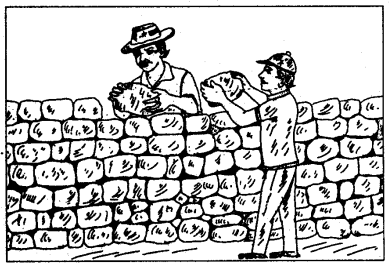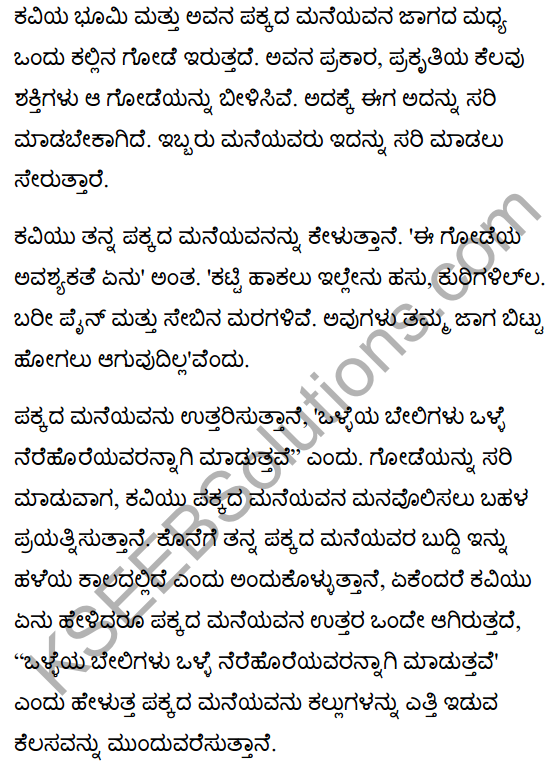Get Mending Wall Questions and Answers Pdf, Notes, Summary Class 10 English Karnataka State Board Solutions Study Material to score good marks in the exam. Various chapters with subtopics are explained clearly in KSEEB Class 10 English Solutions Material. All the Karnataka Secondary Education Examination Board Class 10 English Questions, answers along with the explanations are provided by the subject experts. Students can easily learn Karnataka Class 10 Chapter wise English with the help of the step by step guide provided on our site. Learn all the KSEEB Class 10 English concepts to attempt the exam with more confidence. Read all the concepts of Karnataka Board Solutions for Class 10 English Poem Chapter 8 Mending Wall.
Mending Wall Poem Questions and Answers, Notes, Summary
Whether you want to become an expert in English or to get good marks in the exam, you have one and only solution is practicing with Karnataka Class 10 English Chapter wise Solutions. Strengthen your weakness by learning the KSEEB Class 10 English on our site. You can learn directly online on our website or learn off line by downloading Karnataka Class 10 English Chapter wise material. Save your time and read Karnataka Class 10 English Subject at your comfort level.
Comprehension Questions
I. Answer briefly the following questions.
Question 1.
‘Something’ in line 1 refers to:
a. natural causes
b. supernatural causes
c. man-made causes
Answer:
(b) supernatural causes
Question 2.
How does nature disturb the stones on the wall?
Answer:
Wind, snow and rain disturb the stones and make them fall.
Question 3.
How do hunters disturb the stones on the wall?
Answer:
In order to force the rabbit out of its hiding place, the hunters disturb the stones.
Question 4.
Who does “they” in line 7 refer to?
Answer:
The hunters.
Question 5.
Who are the two characters in the poem?. (Note: the speaker is not the poet)
Answer:
The speaker and his neighbour.
Question 6.
When does the mending of the wall take place?
Answer:
At spring, the mending of the wall takes place.
Question 7.
When the poet says, “we have to use a spell to make them balance”
a. he really means that they had to use a magic spell to make the stones stand one above the other
b. he is just saying it humorously
c. he regrets that he did not know the magic
Answer:
(b) he is just saying it humorously.
Question 8.
“I let my neighbour know…” (line 12) What did the speaker let the neighbour know?
Answer:
The speaker lets his neighbour know that they should together repair the wall.
Question 9.
a) What is referred to as just another outdoor game?
Answer:
The keeping of stones one upon the other.
b) Why does the speaker call it a game?
Answer:
He sees no purpose in maintaining that wall and hence considers it a game. •
Question 10.
What argument does the speaker give to convince his neighbour that they do not need the wall?
Answer:
The speaker says that they do not need the wall because their fields are of two different kinds. The neighbour’s field has pine trees whereas the speaker has an apple orchard. The speaker feels his apple trees will never get across and eat the cones under his pines, and vice versa.
Question 11.
What is the neighbour’s stock reply?
Answer:
“Good fences make good neighbours”.
Question 12.
By building a wall between neighbours, what are we ‘walling in’ and what are we ‘walling out’?
Answer:
When we ‘wall in’ something, we are declaring that the property is solely ours and nobody else has the right to tread upon it. We ‘wall out’ or keep out everyone else from our property.
Question 13.
The speaker says, “I rather / he said it for himself
a) What does “it” refer to here?
Answer:
“It” refers to whatever is bringing down the wall every time they repair it.
b) What does the speaker mean by this statement?
Answer:
The speaker doesn’t want to say who is destroying the wall every time they rebuild it. He wants the neighbour to understand that walls are not being liked and hence they are being destroyed every time.
Question 14.
How does the neighbour carrying a stone in each hand appear to the poet?
Answer:
The neighbour looks like a savage from the old stone age to the speaker.
Question 15.
Darkness in line 41 refers to
a. darkness In the woods under the shade of a tree.
b. mental darkness, ignorance
c. his ‘blindness’ to see the light in the speaker’s arguments.
Answer:
(b) mental darkness, ignorance.
Question 16.
Frost says that his poem is a metaphor, saying one thing and meaning another. The wall in the poem is a metaphor. What do you think is the metaphorical meaning of a wall?
Answer:
The metaphorical meaning of the wall is the emotional barrier that people. erect between themselves and others.
Question 17.
Why do you think the speaker presents the wall? What does he want?
Answer:
The speaker does not relish the idea of a wall between neighbours who have nothing to fear from the other person. Besides, he finds that every spring-time, the wall is destroyed and they have to rebuild it. He finds this exercise futile because there are no cows too to keep away.
II. Close Study
Read the following extract carefully. Discuss in pairs and then write the answers to the questions given below them.
Question 1.
“He moves in darkness as it seems to me, Not of woods only and the shade of trees.”
a) Who does ‘he’ in the first line refer to?
Answer:
The neighbour.
b) What does ‘darkness’ mean here?
Answer:
Ignorance.
c) Why does the speaker say that ‘he’ moves in darkness?
Answer:
The neighbour just repeats a sentence his father had told him and doesn’t give any other explanation for the futile exercise of maintaining the wall.
Question 2.
“Stay where you are until our backs are turned”
a) Who are these words said to?
Answer:
The boulders that make up the wall.
b) Who does “our” refer to?
Answer:
The speaker and his neighbour.
c) What is the tone of the speaker?
Answer:
humour.
III. Paragraph Writing
Discuss in pairs the answers to the following question. Individually note down the points and then develop the points into one paragraph answer.
Question 1.
If you were given a chance to live with one of these characters in the poem, who would you like to live with? Why?
Answer:
- The speaker; he is very logical and reasonable.
- He has a good sense of humour.
- He does not follow anything blindly but questions everything.
- He wants to be in perfect harmony with everyone, doesn’t want barriers between human beings.
Paragraph: The speaker is more logical and reasonable and he has a good sense of humour. When the stones on barrier fall down due to rain and wind, he feels that the neighbour looks like a savage from the old stone era when he silently carries the stones and places them on the wall. For speaker’s repeated queries, the neighbour replied ‘good fences make good neighbours”. The speaker wants to be in perfect harmony with all human beings and doesn’t want any barriers at all. That is the reason he says that even nature doesn’t want barriers and keeps destroying them every time they repair the wall.
IV. Activities
Question 1.
The two characters, the speaker and the neighbour have two totally opposing views on having a wall between their fields. Given below are a few statements, opinions and attitudes. Say who does each apply to. The first two are done for you.
- something there is that doesn’t love a wall.
- good fences make good neighbours.
- very conservative
- logical and reasonable
- light-hearted, humorous
- playing safe
- respects tradition
- even God and nature seem to be against a wall between men A
- apple orchard
- living beyond the hills
- an old stone savage
- cosmopolitan in outlook
Answers:
- Speaker
- neighbour
- neighbour
- The speaker
- The speaker
- the neighbour
- the neighbour
- The speaker
- The speaker
- the neighbour
- the neighbour
- The speaker.
Question 2.
Group Discussion
Man has built many walls (barriers) that separate man from man. There are social, cultural, religious, regional, political and other barriers all around us.
a) Specify any five of such man-made barriers.
Answer:
- Religious structures into which only people belonging to that particular religion are let in.
- Interaction between people of various social strata is not possible at all times.
- People belonging to a particular party do not entertain people of other parties.
- Transgenders are not allowed to mingle or work with men and women in many fields.
- People of one region are not accepted easily by people of other regions.
b) Are these barriers necessary for a good and happy co-existence?
Answer:
No.
c) Why are they bad?
Answer:
They hinder free interaction among people, and consequently, the quality of life of those people suffers.
d) What can you do to break these barriers?
Answer:
Spread awareness about the danger of these barriers and coax people to remove them.
e) Imagine your life without any barriers. What kind of life would it be?
Answer:
A life full of variety and rich interaction with all kinds of people.
Mending Wall Poem Summary in English
This poem, “Mending Wall” written by Robert Frost. In this poet, the two men are meeting on terms of civility and neighbourliness to build a barrier between them. They do so out of tradition and out of habit.
This poem highlights three themes. They are a barrier, building (segregation of neighbouring house), the doomed nature and our persistence in this activity.

The poet says that there are two types of people namely wall builders and wall breakers.
The speaker says that he does not need a wall because there are no cows to be contained. And in the poem, the line “something there is that does not love a wall” repeated twice.
There should be some intent and value in wall breaking because wall building is social both in the sense of ‘societal’ and ‘sociable’.
The speaker himself goes to the wall at any time of the year to mend the damage done by hunters. The speaker does not require wall as there are no cows.
We can say that figuratively rules and laws are walls whereas justice is the process of wall mending.
It can also be said as a ‘civil’ game through it the speaker can interact with his neighbour.
Mending Wall Poem Summary in Kannada

Karnataka Class 10 English Chapter Wise Solutions PDF will help you to clear all doubts. Learn perfectly by using Karnataka Class 10 English Solutions upplementary Poem Chapter 8 Mending Wall PDF. Leave us a comment to clear your queries. Get instant updates by bookmarking our site. Get the best learning with the effective and excellent step by step KSEEB Class 10 English Guide.